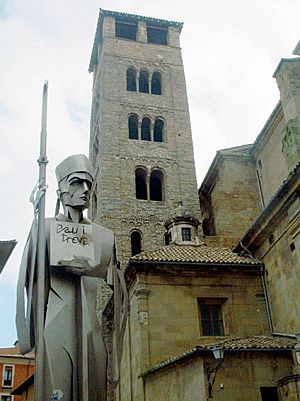Josep Torras i Bages facts for kids
Quick facts for kids Venerable Josep Torras i Bages |
|
|---|---|

Bishop Torras i Bages.
|
|
| Church | Catholic Church |
| Province | Tarragona |
| Diocese | Vic |
| See | Vic |
| Appointed | 10 December 1899 |
| Reign ended | 7 February 1916 |
| Predecessor | Josep Morgades i Gili |
| Successor | Francisco Muñoz Izquierdo |
| Orders | |
| Ordination | 23 December 1871 |
| Consecration | 10 December 1899 by Josep Morgades i Gili |
| Personal details | |
| Birth name | Josep Torras i Bages |
| Born | 12 September 1846 Les Cabanyes, Catalonia, Spain |
| Died | 7 February 1916 (aged 69) Vic, Catalonia, Spain |
| Buried | St. Peter's Cathedral, Vic |
| Nationality | Spanish |
| Denomination | Roman Catholic |
| Occupation | Catholic bishop, apologetic writer. |
| Profession | Catholic bishop |
| Alma mater |
|
| Motto | Pro Christo legatione fungimur (English: Ambassador on behalf of Christ) |
| Signature |  |
| Sainthood | |
| Venerated in | Roman Catholic Church (especially in the sees of Catalonia) |
| Title as Saint | Venerable |
| Shrines | Tomb (St. Peter's Cathedral, Vic) |
Josep Torras i Bages was an important Catalan thinker, writer, and bishop. He was born in Les Cabanyes, Catalonia, on September 12, 1846. He passed away in Vic, Catalonia, on February 7, 1916. He played a big role in Catholic Catalan nationalism around the start of the 20th century.
Contents
Biography of Josep Torras i Bages
Torras and Catalan Traditions
Josep Torras believed strongly in the importance of Christian values. He was concerned about the growing idea of secularism, which means separating government and public life from religious beliefs. In 1892, he wrote a book called La tradició catalana (The Catalan Tradition). In this book, he talked about keeping traditional Christian values alive in Catalonia.
He loved rural life, family, and religion. He also deeply valued the Catalan language and the land itself. He believed that Catalonia needed to stay Christian to be strong and meaningful in the future. A famous quote of his, "Catalunya serà cristiana o no serà" (Catalonia will be Christian or will not be), is carved at the gate of the Santa Maria de Montserrat abbey.
Torras was very interested in studying seny. This is a special Catalan idea that means having good sense, wisdom, and practical judgment. He thought seny came from the traditional Catalan farmhouses, called casa pairal or masia. Life in these rural homes, with their simple living, hard work, and religious devotion, helped people develop these important Catalan values.
His Work as a Church Leader
In 1882, Torras became an advisor to the bishop of Barcelona, J. M. Urquinaona. He was good at helping Catholics solve disagreements. He also reviewed newspapers that were involved in some internal issues within the Spanish Church at that time.
Later, in 1888, Torras saw that Spanish society was becoming less religious. He wrote a book in Spanish called El clero en la vida social moderna (The Clergy in Modern Social Life). In this book, he openly discussed how the Catholic Church in Spain was sometimes too strict or old-fashioned. He encouraged priests to be more moderate and focus on their spiritual lives. He wanted them to adapt to the changing times, but his advice was mostly ignored.
Torras was offered important positions as archbishop in Burgos in 1906 and Valencia in 1913. However, he turned down these offers. He wanted to stay in Catalonia and continue his work there.
His Passing and Recognition
Josep Torras i Bages passed away in Vic in 1916.
In 1931, a process began to have him declared a saint, known as beatification. This process moved slowly due to political reasons. But in 1992, Pope John Paul II officially recognized his heroic virtues. This means he lived a life of great goodness and faith. Because of this, he is now called a venerable. For him to be beatified, the Church needs proof of a miracle linked to him.
His Writings
Most of Josep Torras i Bages's writings have been collected and published under the title Obres completes (Complete Works). His many letters, which are very important for understanding Catalan nationalism, were published in 1998.
As of 2020, you can find the most recent edition of his works and his letters online at archive.org.
See also
 In Spanish: José Torras y Bages para niños
In Spanish: José Torras y Bages para niños
- Seny
- Catalan nationalism
- Catalan symbols
- Cercle Artístic de Sant Lluc
- Roman Catholic Diocese of Vic
 | Mary Eliza Mahoney |
 | Susie King Taylor |
 | Ida Gray |
 | Eliza Ann Grier |


